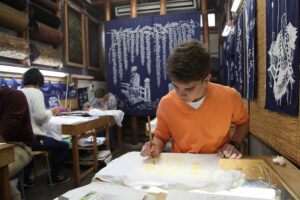Recent Academic Trend in Africa to Gain In-depth Knowledge of the U.S.
An academic movement to expand the knowledge of the United States is spreading across the higher education sector in Africa. Following the trend, the American Language Centre in Morocco, the African Centre for the Study of the United States (ACSUS) at the University of the Witwatersrand, and ACSUS at the University of Pretoria have been established to specialize in the study of the U.S.
Background
To understand multilayered aspects of a country in terms of culture, economy, history, politics, and society, it is important to develop an interdisciplinary study of the region. Accordingly, globally high-ranked universities have research centers dedicated to multidisciplinary research on other countries.
However, it must be acknowledged that education institutions’ commitment to study other regions comes with implications other than for academics; the knowledge gained on other countries and their people is also a useful resource in deciding domestic and foreign policies.
In this vein, universities across Asia, Europe, and North America have their own centers established to research countries in Africa. Lately, the African continent is seeing a reciprocal trend as its universities began training their gaze on other parts of the world. For instance, Stellenbosch University in South Africa founded the Centre for Chinese Studies, and the University of Johannesburg opened the Centre for Africa-China Studies.

In addition, the University of Pretoria is awaiting senate approval to establish a center for Asian Studies under its humanities department. Similarly, other universities in South Africa also opened centers to study Asian and European languages to develop their understanding of other regions.
At the same time, the University of Pretoria takes a step further. While many other African universities have focused more on Asia and Europe, the school also opened ACSUS with a clear goal to alleviate Africa’s disadvantage in knowledge compared to the level of expertise the U.S. has on the continent.
The newfound center aims to become a citadel of learning by fostering international knowledge and training students. Those students, in turn, will eventually contribute their expertise not only in academia, corporates, or foreign ministries but also in Africa’s civil society and media, influencing overall domestic and foreign policies.
Why does it matter for Africa to study the U.S.?
The US has a long history of researching Africa. It has studied the African continent for 74 years with currently over 150 degree courses and nearly 40 centers pertinent to African studies. On the other hand, African countries have merely three studying the U.S.
This imbalance in knowledge production has put African countries in a disadvantaged position. To make it clearer, whereas the US has formulated its policy towards Africa based on their adept research, African countries have struggled to shape their policies regarding the superpower nation. In the absence of delicate policies toward the U.S., getting on an even footing with the U.S. is becoming exponentially difficult for the African states to secure their opportunities in the relation with the world’s strongest nation.
The African continent has started to feel the increasing necessity to advance its knowledge of political, economic, and trade relations in dealing with the U.S. Such an increase in American influence on Africa’s present and future has been predictable, for the superpower’s economic and military interests and activities in the region. Moreover, the reciprocal cultural influence on each other through the African-American population and African diaspora in the U.S. — which will be a great medium for the continent to expand its global influence and presence — is undeniably immense.

In contrast to the long-lasted political stance of the U.S. towards Africa, which was an outcome of the Cold War imperatives and US-China rivalry, the U.S. has recently announced that it will treat African countries as equal partners. The announcement was surprising, and yet fortunate for the continent, considering that the U.S. creates the second most jobs in Africa after China.
Regarding trade and investment, the U.S. was the third-largest investor in Africa in 2017 with $50 billion, following France and the Netherlands which invested $64 billion and $63 billion, respectively.
On the other hand, the political system of the U.S. is also a good motivation for Africa to study the country. This is especially the case since, as of 2020, there are only seven countries in sub-Saharan Africa that are considered “free” with reliable democracy. Although the U.S. has recently experienced threats to its democracy from its own people and its political system carries quite a few dysfunctional aspects, the country still stands as an epitome of a working democracy.
Furthermore, it should be noted that Africa’s most underrated export — brainpower — takes a big part in the American health system. Specifically, between 2004 and 2013, the migration of African physicians to the U.S. increased by 40 percent, resulting in a grand total of 23 percent of physicians in the U.S. originating from Africa.
Summary
In this context, academic institutions in Africa should host more programs and centers to develop knowledgeable insights into the U.S. In turn, such programs and centers should delve into the country’s economy, history, politics, and society, as well as its cultural aspect, on which the continent exerts and receives great influence. By so doing, African states will be able to formulate delicate domestic and foreign policies based on empirical evidence, leveraging opportunities from multilateral relations with the US.
Read More: Race-conscious College Admissions Policies at Risk



